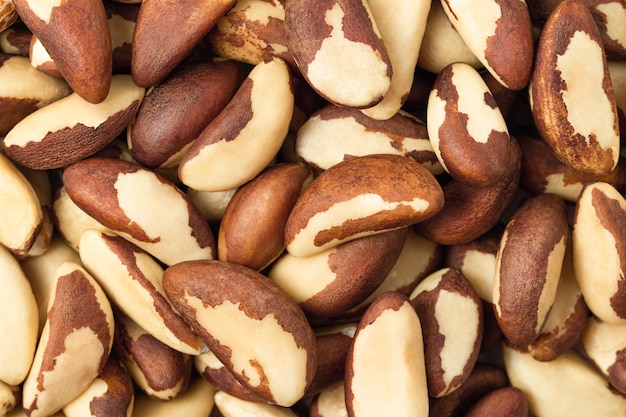Although fish and meat are sources of selenium, you can get it from several plant sources, which provide a healthier nutritional plan. In fact, many natural foods provide great sources of selenium, including nuts, seeds, and green vegetables.
What Are The Best Sources of Selenium?
Let’s take a look at the seven best vegetarian sources of selenium.
Brazil Nuts
Without a doubt, Brazil nuts are one of the best sources of selenium! Tasty, delicious, and loaded with selenium, one study showed that just two Brazil nuts per day for 12 weeks raised selenium levels to a normal range. A half-ounce contains a whopping 268 mcg, which is 479% of the daily requirement, and only 95 calories. Just one Brazil nut per day can provide 75 mcg of selenium.
Shiitake/White Button Mushroom
Shiitake mushrooms not only taste great but also provide selenium, Vitamin D, antioxidants, and other essential trace minerals. White button mushrooms also contain selenium and are one of the few non-animal sources of vitamin D. A half-cup of shiitake mushrooms contains 18 mcg of selenium, providing 33% of your daily requirement, while one cup of white button mushrooms contains 8.8 mcg of selenium.
Lima & Pinto Beans
While lima and pinto beans might not be the favorite food of third graders, their nutritional value is undeniable. Besides selenium, they are great sources of protein and fiber. One cup of cooked lima or pinto beans contains 10 mcg of selenium, about 17% of your daily requirement, and only 205 calories.
Chia Seeds
Chia seeds are a favorite superfood known for their unique ability to expand and take on a gel-like consistency when exposed to water, making chia pudding a popular treat. They are rich in fiber, amino acids, and have a perfect balance of omega-3 and omega-6 fatty acids. One ounce contains 15 mcg of selenium, providing 28% of your daily requirement, with only 138 calories per ounce.
Brown Rice
For those looking for a gluten-free grain, brown rice is an excellent option. It’s an all-around source of essential nutrients, including complex carbohydrates, B vitamins, and soluble fiber. One cup of brown rice contains 19 mcg of selenium, about 35% of your daily requirement, and only 216 calories.
Seeds (Sunflower, Sesame, and Flax)
Seeds are nutritional powerhouses, rich in essential omega-3 and omega-6 fatty acids, protein, and fiber. They’re also excellent sources of selenium. A quarter-cup of sunflower seeds contains 19 mcg of selenium, 34% of the daily requirement, and 204 calories. The same amount of sesame seeds contains 12 mcg of selenium, 23% of the daily requirement, and 206 calories. Two teaspoons of flaxseed contain 4 mcg of selenium, 7% of the daily requirement, and 75 calories.
Broccoli, Cabbage, Spinach
Green vegetables like broccoli, cabbage, and spinach are excellent sources of various nutrients, including selenium. One cup of cabbage contains 3.5 mcg of selenium, 6% of the daily requirement, and 44 calories. One cup of spinach contains 3 mcg of selenium, 5% of the daily requirement, and 41 calories. One cup of broccoli contains 2.5 mcg of selenium, 4% of the daily requirement, and 55 calories.
These are just a few vegetarian-friendly sources of selenium that you can add to your diet to boost its nutritional value. You can also opt for supplementation. If that’s the case, always choose a high-quality supplement like Global Healing’s vegan-friendly selenium supplement, which is a highly bioavailable supplement extracted from certified-organic mustard seeds.

